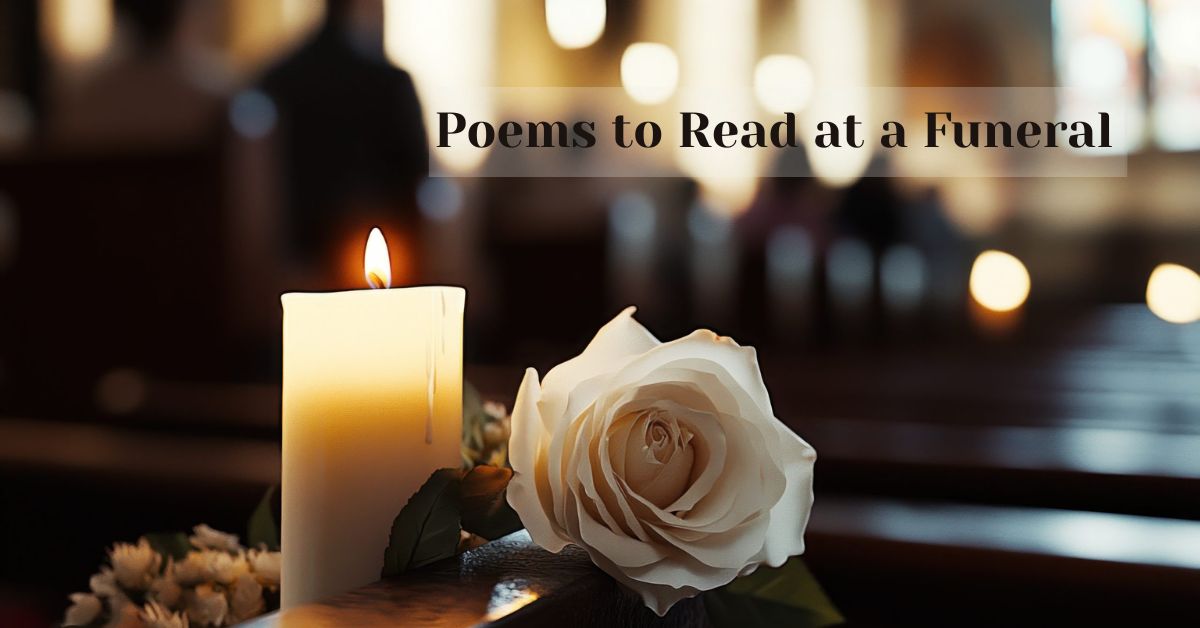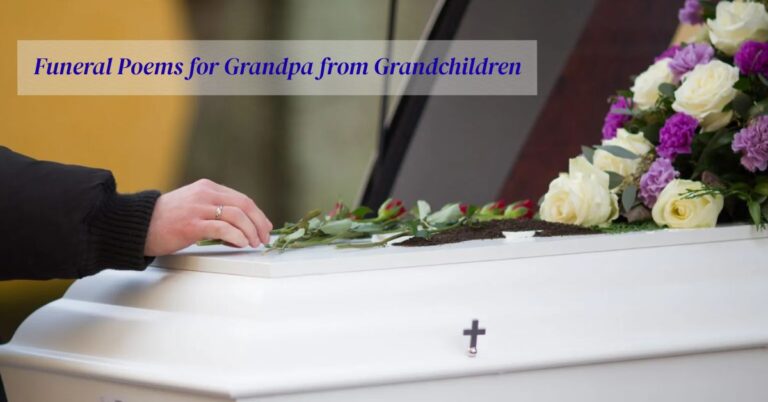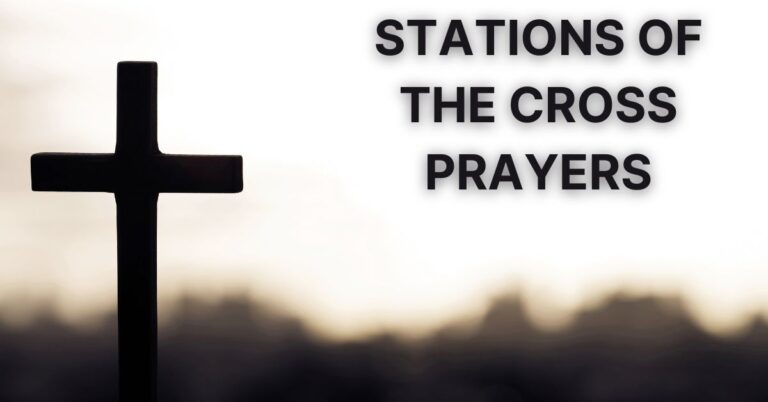When grief overwhelms and words fail us, funeral poems become lifelines that connect our hearts to healing. These carefully selected verses offer solace during life’s most challenging moments, transforming raw sorrow into meaningful tributes.
Whether seeking comfort for yourself or honoring a departed loved one, these funeral poems provide the eloquent expression that grief often steals from us.
“Do Not Stand at My Grave and Weep” – Mary Elizabeth Frye
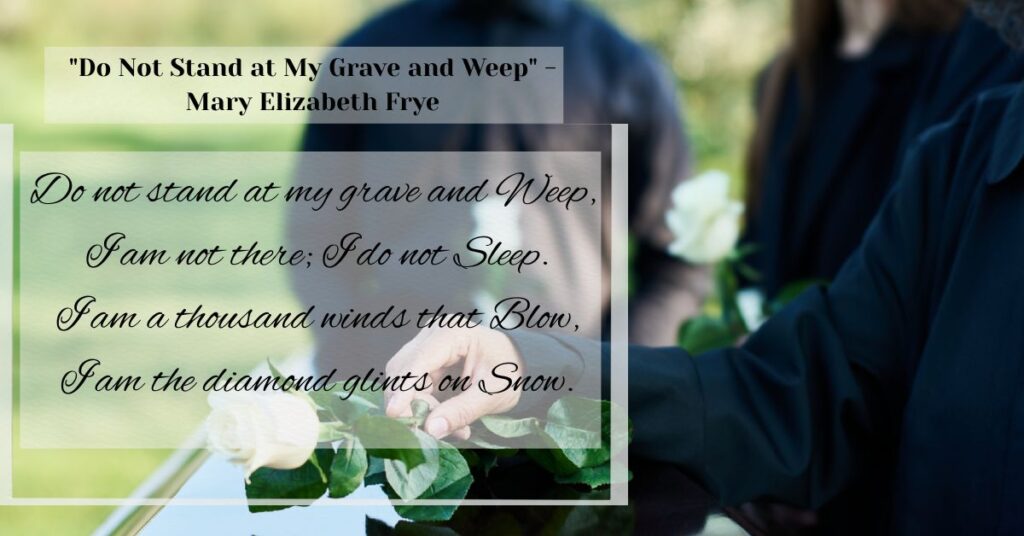
Do not stand at my grave and weep,
I am not there; I do not sleep.
I am a thousand winds that blow,
I am the diamond glints on snow.
This beloved funeral poem reassures mourners that death is merely a transition, not an ending. Frye’s timeless verses remind us that our loved ones continue existing in nature’s beauty around us.
“Remember Me” – Margaret Mead
To the living, I am gone,
To the sorrowful, I will never return,
To the angry, I was cheated,
But to the happy, I am at peace.
Mead’s profound reflection acknowledges different stages of grief while offering comfort through perspective. This poem validates various emotional responses while gently guiding toward acceptance and peace.
“Gone Too Soon” – Michael Jackson Inspired
Like a comet blazing ‘cross the evening sky,
Gone too soon, gone too soon.
Like a rainbow fading in the twinkling of an eye,
Gone too soon, shiny and oh so bright.
Perfect for memorial services honoring those who died young, this adaptation captures the bittersweet beauty of lives that burned brightly but briefly. The imagery resonates with anyone mourning premature loss.
“She Is Gone (He Is Gone)” – David Harkins
You can shed tears that she is gone,
Or you can smile because she has lived.
You can close your eyes and pray that she’ll come back,
Or you can open your eyes and see all she’s left.
Harkins presents two paths through grief—dwelling in sorrow or celebrating life’s gifts. This funeral reading empowers mourners to choose gratitude over despair while honoring their loved one’s legacy.
“Afterglow” – Helen Lowrie Marshall
I’d like the memory of me to be a happy one,
I’d like to leave an afterglow of smiles when life is done.
I’d like to leave an echo whispering softly down the ways,
Of happy times and laughing times and bright and sunny days.
Marshall’s gentle verse focuses on positive remembrance rather than mourning. This poem encourages celebrating joyful memories while acknowledging that love transcends physical presence.
“The Dash” – Linda Ellis
For it matters not, how much we own,
The cars, the house, the cash.
What matters is how we live and love
And how we spend our dash.
Ellis’s powerful metaphor reduces life to the dash between birth and death dates on tombstones, emphasizing that our actions and relationships define our true legacy. This poem inspires reflection on what truly matters.
“Funeral Blues” – W.H. Auden
Stop all the clocks, cut off the telephone,
Prevent the dog from barking with a juicy bone,
Silence the pianos and with muffled drum
Bring out the coffin, let the mourners come.
Auden’s raw, honest portrayal of overwhelming grief validates the feeling that the world should stop when we lose someone precious. This poem gives voice to the intensity of early bereavement.
“When Great Trees Fall” – Maya Angelou
When great trees fall,
rocks on distant hills shudder,
lions hunker down in tall grasses,
and even elephants lumber after safety.
Angelou’s metaphorical masterpiece describes how significant losses create ripple effects throughout our world. This poem acknowledges that some deaths shake the very foundation of our existence.
“Nothing Gold Can Stay” – Robert Frost

Nature’s first green is gold,
Her hardest hue to hold.
Her early leaf’s a flower;
But only so an hour.
Frost’s meditation on life’s fleeting beauty offers comfort through nature’s cycles. This brief but profound poem reminds us that impermanence makes precious moments even more valuable.
More Post: 25+ Heartfelt Funeral Poems for a Mother from Daughter
“Turn Again to Life” – Mary Lee Hall
If I should die and leave you here a while,
Be not like others sore undone,
who keep long vigils by the silent dust
and weep.
Hall’s encouraging words urge mourners to continue living fully after loss. This poem balances honoring grief with embracing life’s ongoing possibilities and joys.
“A Thousand Winds” – Unknown
Do not stand at my grave and cry,
I am not there, I did not die.
I am a thousand winds that blow,
across Northland’s bright and shining snow.
Similar to Frye’s classic, this version emphasizes spiritual continuation through natural elements. The poem provides comfort by suggesting our loved ones remain present in the world’s beauty.
“Miss Me But Let Me Go” – Edgar Albert Guest
When I come to the end of the road
And the sun has set for me
I want no rites in a gloom-filled room,
Why cry for a soul set free?
Guest’s uplifting perspective reframes death as liberation rather than loss. This poem encourages celebrating freedom from earthly struggles while maintaining loving memories.
“Crossing the Bar” – Alfred Lord Tennyson
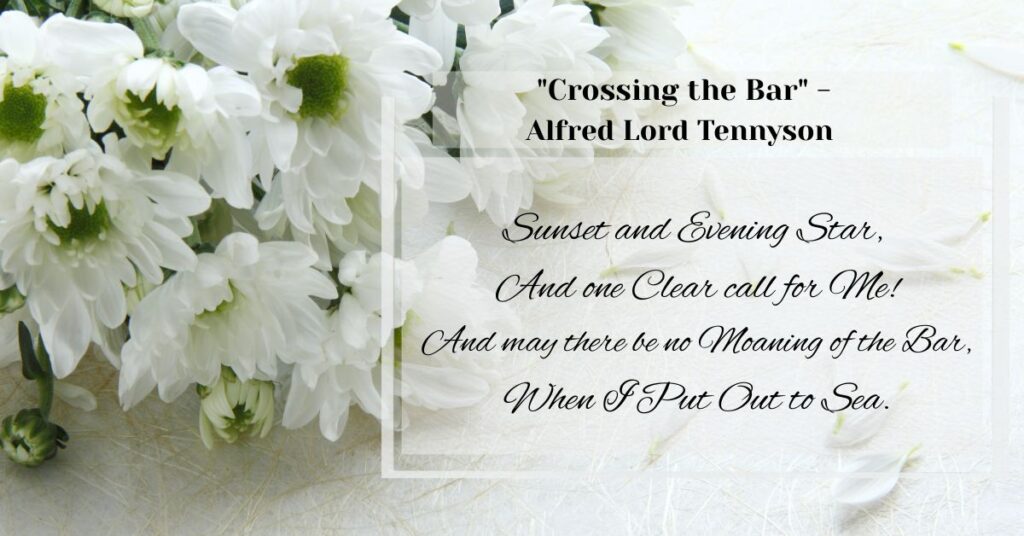
Sunset and evening star,
And one clear call for me!
And may there be no moaning of the bar,
When I put out to sea.
Tennyson’s maritime metaphor presents death as a peaceful journey rather than frightening unknown. This classic Victorian poem offers serene comfort through beautiful imagery.
“High Flight” – John Gillespie Magee Jr.
Oh! I have slipped the surly bonds of Earth
And danced the skies on laughter-silvered wings;
Sunward I’ve climbed, and joined the tumbling mirth
of sun-split clouds,—and done a hundred things
Magee’s aviation-inspired verse celebrates freedom and transcendence. Originally written by a pilot, this poem beautifully captures the soul’s release from earthly constraints.
“The Ship” – Bishop Charles Henry Brent
What is dying? I am standing on the seashore.
A ship sails and spreads her white sails to the morning breeze
and starts for the ocean.
She is an object of beauty and I stand watching her
Brent’s nautical metaphor suggests death is merely a departure to distant shores rather than an ending. This poem comforts by reframing loss as continuation beyond our sight.
More Post: 33+Poems to Say Goodbye at a Funeral / Peace Through Verse
“Life Means All That It Ever Meant” – Henry Scott Holland
Death is nothing at all.
I have only slipped away to the next room.
I am I and you are you.
Whatever we were to each other,
Holland’s reassuring words minimize death’s power while emphasizing relationship continuity. This poem suggests that love and connection transcend physical presence.
“We Seem to Give Them Back to You” – Unknown
We seem to give them back to you, O God,
who gave them first to us.
Yet as you did not lose them in giving,
so we have not lost them by their return.
This prayer-like poem offers spiritual comfort by framing death as returning loved ones to their divine source. The verses provide peace for those with religious faith.
“Angels Among Us” – Alabama Inspired
I believe there are angels among us,
Sent down to us from somewhere up above.
They come to you and me in our darkest hours
To show us how to live, to teach us how to give.
This comforting funeral poem suggests our departed loved ones become guardian angels watching over us. The verses provide solace by transforming grief into a sense of continued protection and guidance.
“In the Sweet By and By” – Sanford Fillmore Bennett
There’s a land that is fairer than day,
And by faith we can see it afar;
For the Father waits over the way
To prepare us a dwelling place there.
Bennett’s hymn-inspired verses offer hope through religious faith, promising reunion in a better place. This traditional poem provides comfort for those who find solace in spiritual beliefs about afterlife.
“Amazing Grace” – John Newton (Selected Verses)
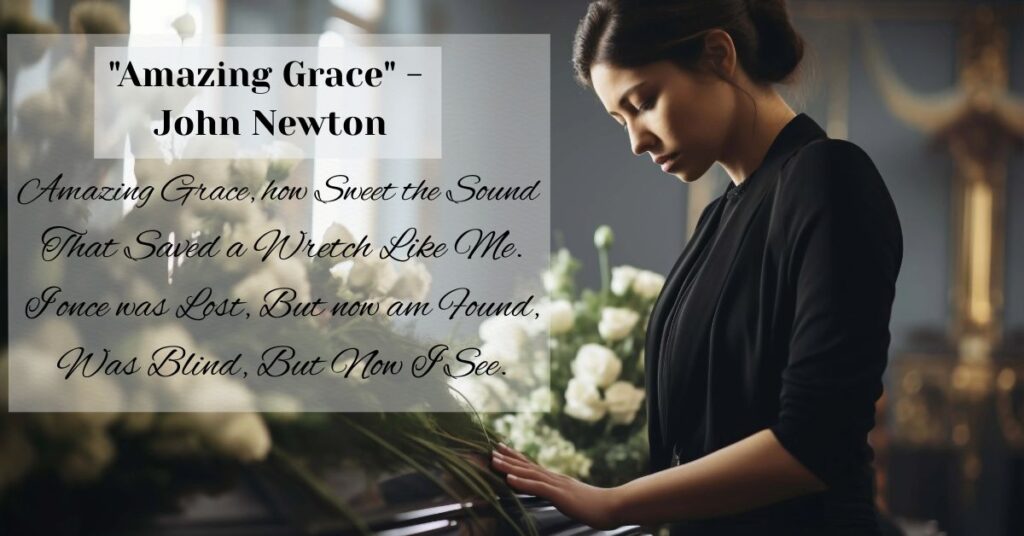
Amazing grace, how sweet the sound
That saved a wretch like me.
I once was lost, but now am found,
Was blind, but now I see.
Newton’s beloved hymn celebrates redemption and spiritual awakening. These familiar words offer comfort through their message of grace overcoming life’s struggles and finding peace.
“How Great Thou Art” – Carl Gustav Boberg Adapted
O Lord my God, when I in awesome wonder
Consider all the worlds thy hands have made,
I see the stars, I hear the rolling thunder,
Thy power throughout the universe displayed.
Boberg’s majestic verses celebrate divine creation and power. This adaptation finds comfort in God’s greatness while acknowledging the magnificent world our loved ones have entered.
“Wings of Eagles” – Isaiah 40:31 Inspired
But those who hope in the Lord
will renew their strength.
They will soar on wings like eagles;
they will run and not grow weary.
This biblical inspiration promises strength renewal through faith. The eagle metaphor suggests transformation and elevation, offering hope that our loved ones have found ultimate freedom and peace.
More Post: 33+ Short Poems for Funeral Flower Cards
“Footprints in the Sand” – Mary Stevenson
One night I dreamed a dream.
As I was walking along the beach with my Lord.
Across the dark sky flashed scenes from my life.
For each scene, I noticed two sets of footprints in the sand.
Stevenson’s beloved poem reassures mourners of divine companionship during difficult times. The message that we’re carried when we cannot walk provides profound comfort during grief’s darkest moments.
“The Guest House” – Rumi
This being human is a guest house.
Every morning a new arrival.
A joy, a depression, a meanness,
some momentary awareness comes as an unexpected visitor.
Rumi’s metaphorical wisdom encourages embracing all emotions, including grief. This poem validates the full spectrum of feelings while suggesting that each emotion brings valuable lessons.
“Death Is Nothing at All” – Henry Scott Holland
Death is nothing at all.
It does not count.
I have only slipped away into the next room.
Nothing has happened.
Holland’s powerful assertion minimizes death’s significance while emphasizing relationship permanence. This comforting perspective suggests that love connections remain unchanged despite physical separation.
“Still Here” – Langston Hughes
I been scarred and battered.
My hopes the wind done scattered.
Snow has friz me,
Sun has baked me,
Hughes’ resilient voice speaks of surviving life’s hardships. This poem celebrates endurance and strength, honoring those who persevered through difficulties with grace and determination.
“Epitaph” – Merrit Malloy
When I die
Give what’s left of me away
To children
And old men that wait to die.
Malloy’s generous spirit encourages giving and service as memorial. This poem transforms grief into action, suggesting that honoring the deceased means continuing their legacy of compassion.
“Let Me Go” – Christina Rossetti
When I am dead, my dearest,
Sing no sad songs for me;
Plant thou no roses at my head,
Nor shady cypress tree.
Rossetti’s gentle release asks mourners to avoid prolonged sorrow. This poem encourages natural grieving while respecting the deceased’s wish for loved ones to find peace.
“Psalm 23” – Traditional Biblical Verse
The Lord is my shepherd; I shall not want.
He maketh me to lie down in green pastures:
he leadeth me beside the still waters.
He restoreth my soul.
This timeless biblical passage offers comfort through divine care imagery. The familiar words provide strength and peace, especially meaningful for those with Christian faith traditions.
“When Someone You Love Becomes a Memory” – Unknown
When someone you love becomes a memory,
that memory becomes a treasure.
Death leaves a heartache no one can heal,
but love leaves a memory no one can steal.
This simple yet profound truth acknowledges grief’s pain while celebrating love’s permanence. The poem validates heartache while emphasizing that precious memories remain untouchable treasures.
“Those We Love Don’t Go Away” – Unknown
Those we love don’t go away,
They walk beside us every day.
Unseen, unheard, but always near,
Still loved, still missed and very dear.
These comforting lines suggest continued presence despite physical absence. The poem provides solace by affirming that love maintains connection beyond death’s apparent separation.
“Beautiful Boy (Darling Boy)” – John Lennon Adapted
Close your eyes,
Have no fear,
The monster’s gone,
He’s on the run and your daddy’s here.
Lennon’s tender words offer paternal comfort and protection. This adaptation works beautifully for memorial services honoring children or celebrating parent-child bonds that transcend earthly existence.
“Dance with My Father” – Luther Vandross Adapted
Back when I was a child,
Before life removed all the innocence,
My father would lift me high
And dance with my mother and me.
Vandross’s touching tribute celebrates family love and cherished memories. This adaptation honors parent-child relationships while acknowledging how precious moments become treasured remembrances.
“Tears Are the Silent Language of Grief” – Voltaire Inspired
Tears are the silent language of grief,
Speaking what words cannot express.
In salt and sorrow, love finds relief,
Healing hearts in their distress.
This philosophical reflection validates tears as meaningful communication. The poem honors crying as a natural expression of love and loss rather than weakness to overcome.
Additional Memorial Verses for Special Circumstances
For Military Veterans
They shall grow not old, as we that are left grow old:
Age shall not weary them, nor the years condemn.
At the going down of the sun and in the morning
We will remember them. – Laurence Binyon
For Healthcare Workers
They dedicated their lives to healing others,
Gentle hands and compassionate hearts.
Though their earthly service has ended,
Their legacy of care never departs.
For Teachers and Mentors
A teacher affects eternity;
They can never tell where their influence stops.
Seeds of wisdom planted with love
Continue growing long after their voice drops.
Conclusion
Funeral poems serve as bridges between overwhelming grief and gradual healing, offering language for emotions that often feel beyond expression. These carefully selected verses provide comfort, validation, and hope during life’s most challenging transitions while honoring the precious lives we celebrate.

Admin of Wingshup.com, sharing powerful Prayers, heartfelt words, and daily Blessings. Helping you Find peace, hope, and strength through Faith. Simple messages for Spiritual Growth and Comfort.
